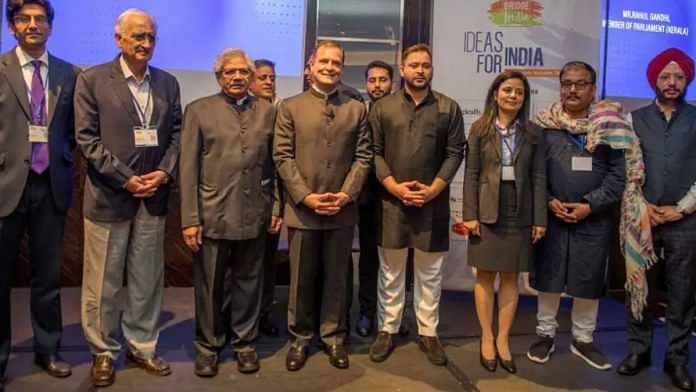A recent visit by a delegation of the opposition leaders to London where it interacted with the Indian diaspora, students, academics, and members of the Labour Party created a huge controversy in India. The sessions, one of which I attended, need to be analysed because they happened in the wake of two critical incidents. The first was UK Prime Minister Boris Johnson’s India visit in April, followed by the Congress party’s three-day brainstorming session, or Chintan Shivir, held in Udaipur, Rajasthan.
One of the main purposes of the London meetings — attended by Congress’ Rahul Gandhi, Salman Khurshid, Sam Pitroda; RJD’s Tejashwi Yadav and Manoj Jha; CPI(M)’s Sitaram Yechury; and TMC’s Mahua Moitra — seems to be to project Rahul Gandhi as the only credible face among India’s opposition. In a careful design, other opposition leaders were not allowed to share the stage with Gandhi.
This was achieved by dividing the delegation into two groups and conducting back-to-back sessions. Rahul Gandhi was given individual sessions whereas others were clubbed together.
Also read: Did Rahul Gandhi need govt permission to attend Cambridge event? Here’s what rules for MPs say
A strategy and an idea
Since this visit comes after Congress’ Chintan Shivir in Udaipur, side-lining other members of the opposition could have been a well-planned strategy by the party. The invitation to other leaders itself seems to be a farce, intended to show unity. The conduct seemed like a deliberate attempt to portray Gandhi as the tallest opposition leader in India. Additionally, while official invitations hardly had the name of Gandhi, his participation was communicated informally. Again, this could have been due to the strategy of Congress leaders to act as gatekeepers.
The deliberations in these meetings were primarily focused on the ‘Ideas for India’. The opposition leaders argued that they have been fighting a battle to preserve the ‘Ideas for India’, which is under severe threat due to the unprecedented rise of BJP and its Hindutva ideology. While ‘Ideas for India’ are rooted in the principle of ‘unity in diversity’, the opposition said the BJP is promoting ‘unity with uniformity.’
Indian leaders stressed on Congress’ long relationship with members of the Labour Party in Britain and the Democratic Party in the US. It was emphasised that opposition parties across the globe that subscribe to ideas of secularism, democracy, social justice, and diversity need to rebuild ties to counter the draconian rise of far-right parties. Indian leaders argued that Indian democracy needs to be protected from the onslaught of Hindu Right for global public good.
This argument has been framed on the proposition that Indian democracy has set an example by providing universal adult suffrage to women much before developed countries did. It also presents a model for sustaining democracy despite diversity and severe economic inequalities. Furthermore, it has evolved a mechanism of promoting power-sharing among communities through autonomy of State, affirmative action policies, and special protection for tribes and other ethnic minorities.
Also read: Congress can hold a million ‘Chintan Shivirs’ but can’t defeat BJP until Rahul is around
Reluctance to learn
The passionate appeals to save Indian democracy notwithstanding, India’s opposition leaders could not provide a concrete roadmap to achieve the results. They also showed reluctance to learn from Britain’s Labour Party, which has shown signs of a comeback after a humiliating defeat in the December 2019 general elections.
The Labour Party worked on three fronts. First, it replaced radical Left-wing leader Jeremy Corbyn with moderate leader Keir Stammer in a democratic election process. Corbyn had resigned after a humiliating defeat, announcing never to return as the party’s prime ministerial candidate. In contrast, the Congress has failed to find a new leader even after two successive defeats in parliamentary elections. Political parties play a significant role in teaching the democratic process to society. By abandoning its internal democratic process, the Congress tells Indian society and other parties not to act democratically.
Second, after electing its new leader Stammer, the Labour Party has made a solid shadow cabinet to attack the government and expose its policies. The Congress has not been able to make effective changes in its legislative wing. The party’s old leaders and its prominent face, Rahul Gandhi, attend parliamentary sessions like guests who make a few allegations and then leave. His attitude in Parliament has been like a stage performer.
Third, India’s opposition leaders, particularly Rahul Gandhi, have repeatedly emphasised the importance of ideas and ideologies over winning elections. The British Opposition party also deliberated on this issue during their leadership contest. Senior party leaders argued that in democracy, the party has to win elections to implement new policy ideas, otherwise they cannot serve any value. This does not mean that the Labour Party has abandoned its radical ideas completely, but back-seated those ideas for winning elections.
India’s opposition leaders have to introspect whether their quest is to protect their power and privilege in the garb of democracy, secularism, and social justice. They need to set an example by being democratic in their conduct and adopting best practices from political parties worldwide.
Arvind Kumar is PhD in Politics, Department of Politics & IRs, Royal Holloway, University of London. He tweets @arvind_kumar__. Views are personal.
(Edited by Zoya Bhatti)



